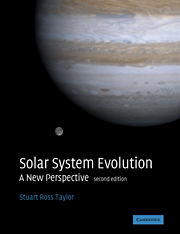Book contents
- Frontmatter
- Contents
- Preface to the First Edition
- Preface to the Second Edition
- Acknowledgments
- Prologue
- Chapter 1 A brief history
- Chapter 2 The universe
- Chapter 3 Stars
- Chapter 4 The solar nebula
- Chapter 5 Composition and chemical evolution of the solar nebula
- Chapter 6 The evidence from meteorites
- Chapter 7 Building planets
- Chapter 8 The giant planets
- Chapter 9 Satellites and rings
- Chapter 10 The refugees
- Chapter 11 The survivors: Mercury and Mars
- Chapter 12 The twins: Venus and the Earth
- Chapter 13 The Moon
- Chapter 14 The role of impacts
- Chapter 15 Epilogue: on the difficulty of making Earth-like planets
- Name index
- Subject index
Prologue
Published online by Cambridge University Press: 05 June 2012
- Frontmatter
- Contents
- Preface to the First Edition
- Preface to the Second Edition
- Acknowledgments
- Prologue
- Chapter 1 A brief history
- Chapter 2 The universe
- Chapter 3 Stars
- Chapter 4 The solar nebula
- Chapter 5 Composition and chemical evolution of the solar nebula
- Chapter 6 The evidence from meteorites
- Chapter 7 Building planets
- Chapter 8 The giant planets
- Chapter 9 Satellites and rings
- Chapter 10 The refugees
- Chapter 11 The survivors: Mercury and Mars
- Chapter 12 The twins: Venus and the Earth
- Chapter 13 The Moon
- Chapter 14 The role of impacts
- Chapter 15 Epilogue: on the difficulty of making Earth-like planets
- Name index
- Subject index
Summary
A principal task in writing in the first edition of this book was to examine the series of events that led to the formation of the solar system. The conclusion, so greatly illuminated by the previous three decades of planetary exploration by spacecraft, was that random events had predominated in the construction of the great variety of planets and satellites. Thus it was unlikely that duplicates might be found elsewhere. This was in contrast to earlier views that the solar system was as orderly as a clock and that, given sufficient computer power, one might simulate the construction of such a clockwork system from first principles according to the laws of physics and chemistry.
In the 1992 edition, I commented that “the … common occurrence of disks around young … stars strengthens the case for the existence of other planetary systems. If so, would they resemble our own? Would we see something like the Galilean satellite system of a few equal-sized planets, systems with one giant planet, or a single brown dwarf companion?” After contemplating the satellite systems around our giant planets, I concluded that “no simple sequence of reproducible events has occurred in our solar system. Other planetary systems … will be different in detail to our own. What their satellites might look like is only for bold spirits to predict” (p. 251).
- Type
- Chapter
- Information
- Solar System EvolutionA New Perspective, pp. xxiii - xxivPublisher: Cambridge University PressPrint publication year: 2001



